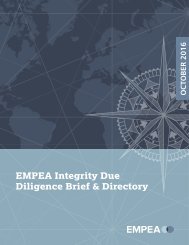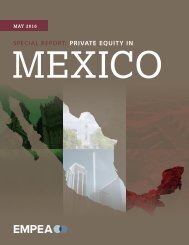You also want an ePaper? Increase the reach of your titles
YUMPU automatically turns print PDFs into web optimized ePapers that Google loves.
The federal GFCI countries with multiple centres are clearly the USA, Canada, and Switzerland. A federal country which<br />
has consolidated on a single centre is Germany, i.e., Frankfurt. With the odd minor satellite centres—Osaka in Japan,<br />
Edinburgh and Glasgow in the UK (though arguably with a country label)—the only problematic centralised country is China,<br />
arguably not federal despite the provincial system with Beijing, Shanghai, Hong Kong and Shenzhen (also symbiotic with<br />
Hong Kong). Second, financial centres seem to grow either from a strong hinterland, implying a significant economy (no<br />
specific numbers but perhaps a 20+ million population and certainly a US$1,000/capita+ GDP; or third, from a commitment<br />
to building an international financial centre, e.g., Mauritius. Equally, there are smaller capital economy centres that might do<br />
very well relative to their economy, e.g., Windhoek, and deserve support yet not merit a GFCI rating.<br />
With that background, a few centres beyond Casablanca, Johannesburg, Port Louis and Nairobi seem to be worth watching:<br />
• Offshore?—Djibouti, Botswana, the Seychelles, Gabon, Equatorial Guinea and Réunion (Djibouti, Gaborone,<br />
Victoria, Libreville, Malabo and Saint-Denisare) are potential ‘<strong>of</strong>fshore’ centres. That said, Réunion is unlikely, given<br />
the French system, to have the degrees <strong>of</strong> freedom needed to be an <strong>of</strong>fshore centre. Equatorial Guinea has significant<br />
organisational stability issues. Thus, it seems only Djibouti, Botswana, Gabon and the Seychelles might make a larger<br />
play to be international financial centres if they so desired;<br />
• <strong>Capital</strong> Economy—Harare, Lusaka, Accra, Abidjan, Dakar, Yaoundé, Khartoum, Algiers, Tunis, N’Djamena, Juba<br />
and Luanda should all be on a watch list as centres that would accompany successful economic development;<br />
• Federal—South Africa (current financial centre Johannesburg, formal capitals Pretoria (executive), Bloemfontein<br />
(judicial), Cape Town (legislative)) and Nigeria (formal capital Abuja, vastly larger economic city Lagos) are both<br />
countries where the capital is ever unlikely to be the financial centre, yet might support multiple financial centres as<br />
do the USA and Canada.<br />
3. GFCI SUB-INDICES ANALYSIS<br />
3.1 Industry Sector Sub-indices<br />
GFCI categorises participants according to the sector in which they work.<br />
industry sectors:<br />
We aggregate these into five main<br />
• Investment management;<br />
• Banking;<br />
• Insurance;<br />
• Government and regulatory; and,<br />
• Pr<strong>of</strong>essional services.<br />
The GFCI model is re-run to derive scores for each separate sub-industry by removing respondents from the other sectors;<br />
all the instrumental factors remain as inputs but the only responses considered are the ones that come from pr<strong>of</strong>essionals<br />
working within a particular sector (e.g., responses from banking pr<strong>of</strong>essionals only or responses from insurance pr<strong>of</strong>essionals<br />
only). The tables below show the scores and ranks within each industry sector for the group:<br />
124 |





